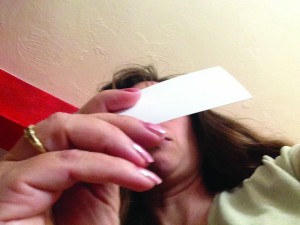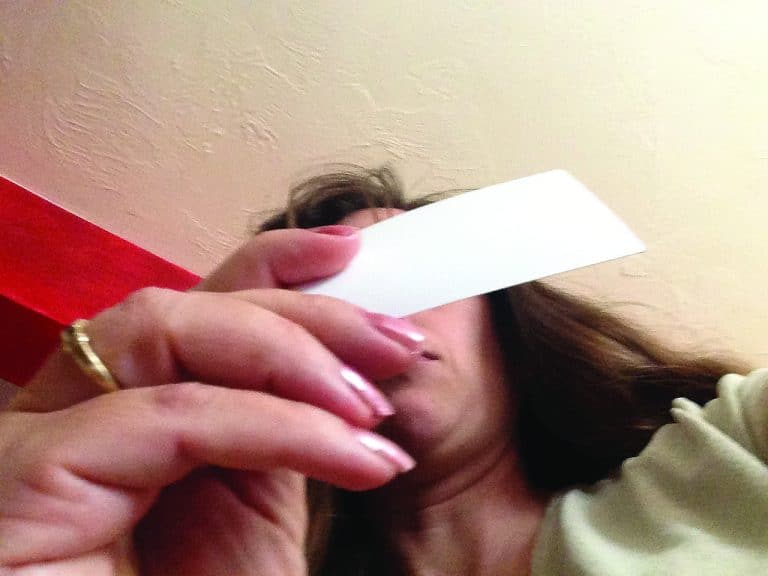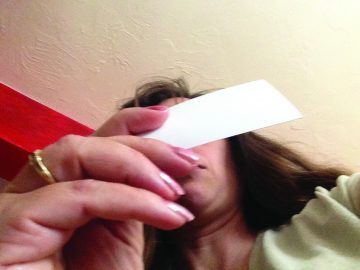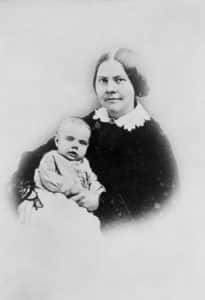I smiled at the delivery person who brought me my new business cards. Then I glanced down at them and my smile melted. My maiden name, which I had spelled out proudly in between my first name and my husband’s last name ever since I had been married, had been reduced to an initial with a dot next to it.
An initial! As if my maiden name were just a throw-away middle name like Ann (A.) or Lyn (L.) or even one of those ugly names designed to be hidden: the kind placed there in honor of some relative with a wonderful character but a really hideous moniker. (I won’t list these.)
I never abbreviate my maiden name. In fact, my husband notes with mild derision that I tend to sign my name by writing out my first and maiden names and then carelessly abbreviating the last name he gave me.
 I couldn’t give up my maiden name when I married. It’s not that my maiden name represents a noble and glorious ancestral heritage—at least, I don’t think it does. I could never make myself get excited about genealogy.
I couldn’t give up my maiden name when I married. It’s not that my maiden name represents a noble and glorious ancestral heritage—at least, I don’t think it does. I could never make myself get excited about genealogy.
However, it does represent an integral part of me that I can’t give up. It is the name of my childhood. It is the name printed on the diplomas I worked so hard to earn. When I was a Mormon missionary, my first name temporarily disappeared completely, replaced by the title Hermana. My maiden name was my only identifier.
Some of my friends did not change their names when they married. I have nothing against that choice but I thought it would be logistically easier if I had the same last name as my husband and future children. Besides, I had no middle name and my maiden name is only one wee syllable. Even with two last names, my name is reasonably short—definitely short enough to make initializing unwarranted.
I scowled at the business cards. I believe in choosing my battles. Was this battle worth fighting? Did I care enough about my maiden name to pick a fight about business cards, when there are always so many other workplace issues needing attention?
That stupid initial frowned back at me. I put on my virtual battle gear with my full name figuratively embossed across the back, including, of course, my unabbreviated maiden name, and prepared for a chat with my supervisor about why I needed to reorder those cards.






11 Responses
I am glad you decided this was a battle worthy of the pick.
I am not particularly attached to my maiden name, but that has its own story. However, I do love genealogical research and it disturbs me to lose daughters, even momentarily, once they have married; to lose track of a widow or divorced woman, again, even briefly, once she remarries; and to read newspaper accounts that refer to a woman only as Mrs. D. H. Smith (fictional example)–the initials being her husband’s.
So, while not attached to my maiden name, I am very attached to maiden names in general and the identity that they represent. Women don’t lose everything that has made them who they are up to the point that they marry. The marriage ceremony does not erase an individual and replace it with a new one.
You said you respect the choice of women who do change their last name. Absolutely. I did change mine. But, as a corollary, when I divorced, I kept my married name–because part of my identity that I cherished included being the mother of my daughter. I wanted to keep that part of my identity.
And that is the point: Part of being an full individual is for it to be an accepted part of our culture for a woman to decide how she will be identified, what parts of her identity she chooses to have reflected in her name.
Kate @ BJJ, Law, and Living
Yes. Fight for that. I added my husband’s last name to mine so I have a two name last name. He added my maiden name as a second middle, a structure we replicated w my sons. I have to fight all the time to get both my names as my last.
I thought the exact same when thinking of losing my maiden name. Names hold much more power than some may think.
I love that your husband added your maiden name as a second middle name!
Kate @ BJJ, Law, and Living
Like you April, I was given no middle name, so my maiden name is all I have. My maiden name is more often seen as a boy’s first name, and so it confuses people when they see my full name spelled out: just last month a co-worker asked why I had a boy’s name as my middle name. Then I have to explain that I don’t have a middle name and that it is part of my last name.
While I was at first eager when I was married to give up my maiden name and adopt my husband’s last name because I did not like who I was as a teenager (and wanted to leave behind that persona), my company automatically includes my maiden name, and I rather like it now. It seems full to me. Professionally, I now consider myself to have, like Sarah, a “two name last name” (no hyphen). I like who it connects me with.
And I’m with you–I would have had them re-order the cards. They should have everyone verify their information anyway before going through with the expense. Bad contact info on a business card is no good to anyone.
I wonder: is it only a “Mormon” tradition to not give a daughter a middle name? Or does it happen elsewhere in the world? . . . “you don’t need a middle name, honey, you’ll get your husband’s last name when you marry.” Bleh.
I feel the same way. I feel like my maiden name is who I really am as an individual, and my married name is who I am as part of a pair. I”m glad I have a middle name too though
Yes, reorder those cards!
I’ve always done the two name last name, but I’ve written so much stuff stuff online about Mormon feminism (and myself) over the years. So, I dropped my family name when I started work in a new field. I don’t mind if prospective employers see what I’ve done, but I like it that my name is rather generic without my family name and someone would have to be rather interested to find this part of my life.
Good going, April! It’s your name. It belongs on your business cards.
I returned to my maiden name several years after my divorce; talked with my kids about it, who all felt good and understood the reason for my decision. One of my children even asked if she could have my maiden name for her last name. She decided to stick with the one she was born with, but it was a good conversation.
At one time, one of my sister-in-laws questioned the validity of my “claims” of abuse by my father, by saying, “You’d think if those things really happened to you, you wouldn’t want to keep your father’s last name.” I answered, “I’m not the one who defiled our family name. He did that. I’m the one who is restoring honor to this name.” [of course there is more to this story, but it’s not important.]
So, I’m keeping my maiden name. Forever. And returning it to God in its original form, nice and “new”.
I’ve always hated my maiden name. It caused me a lot of pain as a child mostly because it conveniently rhymed with “dork.” I couldn’t wait to get married and get rid of it. But then I didn’t get married until I was 28, and by then I had been using it throughout college and professionally for many years. It became just a name, and I felt even more so after I took my husband’s last name.
The process of changing your last name is a long one, and I’m still finding that because I had lived so long with my maiden name, there are still many agencies, universities, companies, accounts, etc. that are under my old name. Even after changing my name in all the places I can think of, I’ve realized that I will be forever known by both my maiden and married names. Even when I changed my name with social security it felt more like they were just adding a new name to my account more so than changing it.
I would suggest, as others here, that you do have the cards reprinted. What I’ve learned about my experiences with my last names is that you have to let people know exactly what name(s) you want to go by, or they will decide for you.
My wife was rather anxious to take my last name, even though she had professionally been published (in aa few magazines and newspapers) with her full name before we married and she has no middle name. I didn’t have an opinion either way on it. It’s her name, she could do what she liked with it.
My ex kept my last name, citing at the time that it would be confusing for our children to change it back. I have a different opinion of it, but that’s neither here nor there.
For not giving girls middle names, I don’t think it’s a “Mormon” thing. I know of a number of women who are not mormon who do not have middle names and both my sisters and daughter have middle names. What my daughter does with it when she marries (if anything) will be her choice.
Sometimes I wish we’d have kept some of the older naming systems, even if they could get to be a handful. – Ida Karensdaughter, Jack Thomasson, or even Jill daughter of Rachel daughter of Rebecca.
I support anyone to go by the name they want! Our sense of what is “normal” when it comes to names – both first and last names – is influenced much more by our culture than most of us realize. We assume things are somehow “right” or “rules” that are really just customs. In some countries and cultures it is typical to give children the maternal surname, in some it is typical to write the surname first, etc.
Both my husband and I changed our legal last names to be a two-word, non-hyphenated surname made up of both of our original last names. It was a compromise that worked better for us than the alternatives. It is also a logistical nightmare in ways I never imagined…largely because most people in the US are just so used to a one-word last name that came from the husband. It causes problems in travel reservations, correspondence, welcome songs in Primary (picture exasperated music leader rolling eyes as she struggles to fit my name into her song)…but it also leads to a lot of interesting conversations at the DMV!